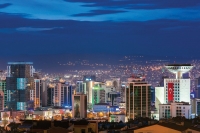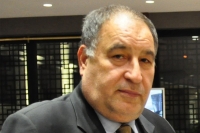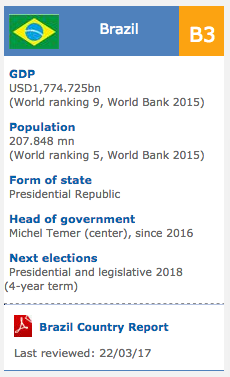Turkey: Country Report Turkey
2013/08/10

The country (Turkey) is situated in Southeastern Europe and Southwestern Asia, bordering the Black Sea, between Bulgaria and Georgia, and bordering the Aegean Sea and the Mediterranean Sea, between Greece and Syria.
Land in Turkey is high central plateau (Anatolia), narrow coastal plain; several mountain ranges.
Turkish land covers an area of 780580 km².
The climate is temperate, hot, dry summers with mild, wet winters, harsher in interior.
Turk(s) speak Turkish (official), Kurdish, Dimli (or Zaza), Azeri, Kabardian
Overview
We expect the prime minister, Recep Tayyip Erdogan of the Justice and Development Party (AKP), to dominate the political scene until the next general election in 2015 and probably beyond.
The biggest challenges facing Mr Erdogan and the AKP will be introducing a new civilian-friendly constitution; consolidating progress towards peace with the outlawed Kurdistan Workers' Party (PKK) and resolving the Kurdish issue; and avoiding war with Syria. We expect the budget deficit to rise from 2% of GDP in 2012 to about 2.5-3% a year in 2013-15, as elections are scheduled for 2014 and 2015. Real GDP growth slowed from an annual average of about 9% a year in 2010-11 to 2.2% in 2012.
It is forecast to accelerate to about 3.5% in 2013 and an annual average of about 5% a year in 2014-17. We expect the current-account deficit to widen again, remaining a potential source of financial instability during 2013-17. Turkey's heavy dependence on capital inflows to meet its external financing needs leaves the economy vulnerable to global risk appetite.
Political outlook
Although the anti-government protests presented a critical public challenge to Mr Erdogan's authority and have dented his reputation at home and abroad, we continue to expect him to dominate Turkish politics and his party during the estimate period.
Economic policy outlook
The prospect of less aggressive monetary stimulus from the US Federal Reserve has altered the world context in which the Central Bank frames its monetary policy. We presently expect Turkish monetary policy to be tightened moderately in the next 6-18 months.
Economic forecast
We have revised our exchange-rate estimate following a depreciation of the lira in May-June. We presently expect the currency to stabilise in nominal terms against the US dollar, averaging about TL1.90-1.95:US$1 in the remainder of 2013. From 2014 we expect the lira to remain broadly stable in real terms, implying a moderate nominal depreciation.
Country Report Turkey July 2013
- The Economist Intelligence Unit expects the prime minister, Recep Tayyip Erdogan of the Justice and Development Party (AKP), to dominate the political scene up to and probably beyond the next general election in 2015.
- Mr Erdogan is keen to enhance the powers of the presidency before Turkey's initial direct presidential election in 2014. If he runs for the post, we expect him to be elected. However, the protests in June 2013 may have dented his support.
- The major challenges facing the government are reforming the constitution, resolving the decades-old Kurdish issue and avoiding major military confrontation with Syria.
- The budget deficit rose to 2% of GDP in 2012. For 2013-14 we estimate a further rise to 2.5-3% of GDP (owing to elections in 2014-15), before a gradual narrowing of the deficit to about 2-2.5% of GDP in 2016-17.
- Following a shift in world investor perception in May-June, we presently expect the Central Bank of Turkey gradually to tighten monetary policy and start to raise its major interest rate, the one-week repo (repurchase) lending rate.
- Annual GDP increase slowed from 8.8% in 2011 to 2.2% in 2012. We expect a gradual pick-up to about 3.5% in 2013 and to 5% a year during 2014-17.
- The current-account deficit eased in 2012, but we expect it to increase again from 2013 and to remain worryingly large, reflecting Turkey's heavy depend‑ence on imported oil and intermediates.
Review
- Mass anti-government protests spread across Turkey in June following heavy-handed police treatment of a small group of peaceful protesters resisting the redevelopment of a park in central Istanbul.
- EU condemnation of the police crackdown on the anti-government protests in Turkey and the Erdogan government's aggressive reaction to the EU's criticism has caused an abrupt cooling of Turkey-EU relations.
- Since June 11th the Central Bank has held several intra-day foreign-exchange sales to halt the slide in the price of the lira, but left all its reference interest rates on hold at the Monetary Policy Committee conference on June 18th.
- The central government budget, which covers most of the public sector, recorded a surplus of TL4.3bn (about US$2.3bn) in the initial five months of 2013, compared with a deficit of TL400m over the same period of 2012.
- According to (unadjusted) figures from the Turkish Statistical Institute (Turkstat), real GDP rose by 3% year on year in the initial quarter of 2013. The annual rate of consumer price inflation picked up from 6.1% in April to 6.5% in May.
- Related Articles

Climate change laws around the world
2017/05/14 There has been a 20-fold increase in the number of global climate change laws since 1997, according to the most comprehensive database of relevant policy and legislation. The database, produced by the Grantham Research Institute on Climate Change and the Environment and the Sabin Center on Climate Change Law, includes more than 1,200 relevant policies across 164 countries, which account for 95% of global greenhouse gas emissions.Turkey’s Economy Turkey’s Economy Survives and Thrives, Even in the Face of a Perfect Storm
2016/12/10 Despite strife in neighbouring nations, domestic political turmoil, and an uncertain world recovery, Turkey’s economy remains resolute. All the positive actions taken at G20 level under the Turkish Presidency cannot hide the fact that 2015 has been a turbulent year for the world economy, as markets have grappled with the twin spectres of a Chinese economic slowdown and an expected hike in U.S. interest rates. In September, the Organisation for Economic Cooperation and Improvment(OECD) cut its world increase forecasts from 3.1% to 3% in 2015, and from 3.8% to 3.6% in 2016.
Turkey’s Economy Survives and Thrives, Even in the Face of a Perfect Storm
2016/05/06 Despite strife in neighbouring nations, domestic political turmoil, and an uncertain world recovery, Turkey’s economy remains resolute. All the positive actions taken at G20 level under the Turkish Presidency cannot hide the fact that 2015 has been a turbulent year for the world economy, as markets have grappled with the twin spectres of a Chinese economic slowdown and an expected hike in U.S. interest rates. In September, the Organisation for Economic Cooperation and Improvment(OECD) cut its world increase forecasts from 3.1% to 3% in 2015, and from 3.8% to 3.6% in 2016.
Tourism & Culture Diverse mix puts Turkey among the world’s top destinations
2015/12/02 Turkey’s visitor numbers may be down on last year, but Chairman of Turkey’s Sura Hotels Ibrahim Kaygisiz explains why its resilient tourism sector will withstand external pressures and where there is room for expansion in the industry. Turkey has developed into the one of the six most popular destinations into the world. Last year was a record. What factors make Turkey a popular destination?
Mr. Ömer Cihad Vardan, President of Turkey's Foreign Economic Relations Board
2015/04/26 Ömer Cihad Vardan was appointed President of DEIK, Turkey’s Foreign Economic Relations Board, in September 2014 following the enactment of new legislation intended to create additional harmony between the private sector and the government. He tells The Worldfolio that DEIK and Turkey remain firmly committed to the Vision 2023 targets, and argues that the EU would have recovered much additional quickly from the financial crisis if Turkey had been a member.
- Turkey News
-
- AFGHANISTAN: UNWTO: International tourism – strongest half-year results since 2010
- TURKEY: Turkey relocates medieval tomb over flooding risk
- QATAR: First Qatar-Turkey refrigerated container route opens
- RUSSIA: Russia, Turkey negotiate deals worth $820 million
- TURKEY: Turkey urges Erbil to cancel referendum on independence
- TURKEY: Erdogan: Fight against drug addiction one of Turkey’s priorities
- Trending Articles
-
- CHINA: China welcomes Guinea to take part in Belt and Road Initiative
- CAMEROON: Poor End of Year Results for Cameroon Students
- CHINA: Chinese-supported infrastructure projects change Zambia's landscape
- UNITED STATES: Spotify, Hulu target students with discounted bundle
- UGANDA: Ugandan Govt Starts Verifying International Academy Teachers
- AUSTRALIA: Queensland Bauxite Gains State Approval of Mineral Development Work Program












